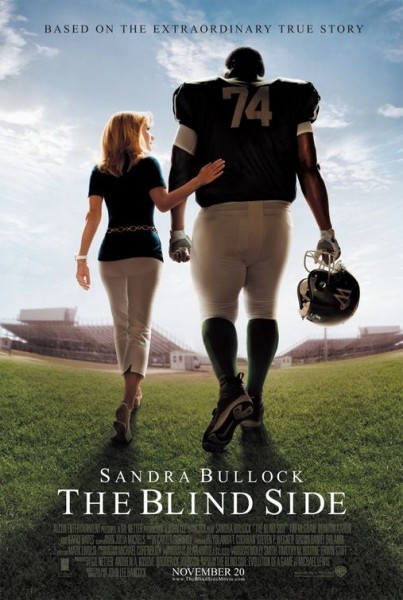Synopsis:
The Blind Side is based on a book of the same name, which itself is based on the true story of Michael Oher. A disadvantaged youth from Memphis, Tennessee, he made the unlikely transition from homeless poverty to college football player with charitable benefactors who helped him there.
Michael Oher was taken in by the Touhey's and studied hard for several months before getting into a prestigious private school, where he worked hard to excel at football and become a player that attracted recruiters from several colleges. His amazing move from the streets to a being a sports star in the NFL inspired Michael Lewis to write about his story, and producers to create "The Blind Side" - which is about as divorced from reality as Oher's true story is unlikely.
Analysis:
All apologies to the real Michael Oher, WB and Quinton Aaron have turned the character into a magical-negro/idiot-savant. Michael (in this film) drifts through life with puppy dog eyes, dumbly stares at the floor and remains nearly mute as white people chatter about their "Christian duty" to look out for him. When he chucks articulate scraps of writing in the trash bin, teachers cluck about spelling. When he is distracted by balloons, the coach bellows. Yet, as he dumbly comes to understand football through the instructions of Ms. Touhey, who tells him it's just like protecting the family, he suddenly becomes a prodigy. And apparently it's the only thing he's good for - all the improvement in his grades is merely to make sure he gets to go on to an athletic scholarship.
The Touhey's themselves are the quintessential essence of patronizing white people. In several scenes, they establish their cultural competency to reach across social divisions through savvy language. SJ, a "precocious" child casually uses spanish words and is the first of the family to reach out to Michael. The Touhey's become something akin to a 15th century patron, as they nurture Michael into a great football player. Ms. Touhey is something like a psychotic, distaff version of Coach Yoast out of Remember the Titans, with a mouthy whelp playing opposite to the "cute-as-a-button" Sheryl Yoast. She bullies and cajoles her family around with the presence of a "big-momma" though her body more resembles a trophy wife for the fast-food entrepreneur, Mr. Touhey. Yet she never seems to miss a beat, as she ventures into the obvious ghetto looking for Michael, mouths off to a child-services worker after she decides she's been waiting too long, and interjects herself into the coaching process.
There is an element of unearthly aberrancy reverberating through the film that would make most sane people uncomfortable in real life. One scene, played in the trailer and at a peak of the film, is where Ms. Touhey confronts her prejudiced friends with their mild offensiveness (which was meek compared to what one would expect in the real world). After she shames them for being un-christian, one profusely appeals to her charity, saying it's remarkable what she's doing for that boy, and how she's "changing his life." Humbly and tearfully, she says, "No, he's changing mine." - Really? The Touheys I saw at the beginning of the film were pretty much the same ones at the end of the movie (with the obvious addition). No family strife was resolved, no deep-seated issues were addressed. In fact, Michael adapts to Touheys about as easily as an orchid living off the shredded bark of it's parent tree.
The second scene is where Michael first comes to the Touheys house on thanksgiving and examines a coffee table book with the iconic Norman Rockwell painting "Freedom From Want." A nice white family, sitting around a bountiful table; what a stark contrast from the place Michael comes from, inhabited by crack addicts like his mother, orphans like his brother, and seedy dealers (like the only other major black character in this film). When dinner is served, the family grabs it and returns to the couch to watch football; but Michael goes to the table and dutifully eats. Ms. Touhey sees this and commands the family to join him. As their daughter reaches her hand across the table to Michael, I was reminded of Uncle Ruckus from the Boondocks meeting Ronald Reagan in heaven - as the gipper reached out to touch him, Uncle Ruckus becomes white, and is struck with a mix of euphoria and redemptive jubilation. You almost expect Michael to break his silence and shout "THANK YOU WHITE GOD!" during the dinner prayer.
Summary:
Apparently, Executives at WB are still saying "What, make a holiday movie about racial issues that isn't framed in a way that makes white people colonialistic and black people helpless beasts?" I don't care if it's a true story; the characters are not real people. Real people are a little more complicated than the cardboard cutouts in The Blind Side.
The Blind Side will make liberals feel good about helping despondent black kids who are victims of circumstance. It'll make conservatives feel good by the subtle nod to the white man's burden and the sports-centric theme of the film. And black people? Hopefully they'll have a nice white family out there willing to cross the tracks to take care of them. Again, the film is about as divorced from reality as you can get.
The short version is best phrased by some guy on Yahoo answers, who said, "This is a movie about white people, for white people, that lets white people feel good about themselves because this one white woman did something decent."
Saturday, June 5, 2010
Subscribe to:
Post Comments (Atom)



These are a great read during class.
ReplyDelete